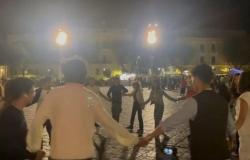From the regional elections in Piedmont to the municipal elections in Bergamo, Florence, Cagliari and Bari. This weekend we will not only vote to elect the 76 MEPs who will sit in the EU parliament in Brussels for the next five years. In fact, 3,698 municipalities with over 15 thousand inhabitants and 3,480 under 15 thousand inhabitants will go to the polls for the first round, with a possible run-off scheduled for 23 and 24 June. In particular, six regional capitals (Bari, Cagliari, Campobasso, Florence, Perugia, Potenza) and 23 provincial capitals (Ascoli Piceno, Avellino, Bergamo, Biella, Caltanissetta, Cesena, Cremona, Ferrara, Forlì) will renew their mayor and municipal council. , Lecce, Livorno, Modena, Pavia, Pesaro, Pescara, Prato, Reggio Emilia, Rovigo, Sassari, Urbino, Verbania, Vercelli and Vibo Valentia)
Five candidates are competing for the Piedmont Region
An armchair for five. In fact, there will be five challengers to the presidency of Piedmont, two men and three women, supported overall by 13 lists and five price lists. Playing the game in the polls are Alberto Cirio, outgoing president and re-nominated for the center right, Gianna Pentenero for the center left, Sarah Disabato for the 5 Star Movement, Francesca Frediani for Piemonte Popolare and Alberto Costanzo for Libertà, a formation born on the impulse of Cateno De Luca. Supporting Alberto Cirio are the Fi lists together with Udc, FdI, Lega, Noi Moderati and the Piedmont Moderate Liberal civic list. Running for the challenger Gianna Pentenero are Pd, Avs, United States of Europe, civic list Pentenero president and civic list Piedmont, ecologist and supportive.
This year, however, the Piedmontese called to elect president of the regional council and council of the twelfth legislature will do so with a new electoral law, approved last July 19, which provides for some changes. Among other things, the new law deals with the representation of the territories with the seats allocated proportionally, provides for the substitutions of the councilors appointed as councilors and establishes gender equality in voting: whoever decides to give two preferences will necessarily have to choose two candidates of different sex, otherwise the second preference will not be taken into consideration.
The regional capitals to vote
In the Apulian city, which has ended up in a storm of controversy after the recent legal proceedings on alleged mafia infiltration, the centre-right is attempting to make a push. Here Pd and M5s run divided: the dems hope to confirm the consensus left by the outgoing mayor Antonio Decaro (now candidate for the European elections) with Vito Leccese while Michele Laforgia is supported by the Five Star Movement. The entire center-right is instead for the Northern League member Fabio Romito. Same situation in Florence, with the outgoing mayor, the dem Dario Nardella, candidate in Brussels and the center-left this time divided with three different candidates: Sara Funaro of the Democratic Party, Lorenzo Masi of M5s and the Renzian Stefania Saccardi of Italia Viva. Eike Schmidt, former director of the Uffizi, heads the centre-right lists. In Bergamo, competing for the seat of the dem Giorgio Gori, already in his second term, are Elena Carnevali (dem candidate), Andrea Pezzotta (candidate of the centre-right) and Vittorio Apicella (candidate of the M5s).
In Cagliari the mayor Paolo Truzzu resigned following his proclamation as regional councilor. Five candidates are therefore competing at the polls, but all eyes are on the Zedda vs. Zedda duel. In the Sardinian capital the centre-right is focusing on a woman, the former vice president of the Region Alessandra Zedda, former councilor for Labor in the Solinas council, a member of Forza Itala who moved to the League, supported by eight lists: FdI, Lega, Fi, Sardinian Reformers, Sardinia at the center 20Venti, Psd’Az, Alleanza Sardegna and Movimenti Civico. Calenda con Azione also supports the centre-right candidate. This is, however, a third chance for the centre-left candidate Massimo Zedda, already mayor for two terms from 2011 to 2019, when he left to try to conquer the Region but was defeated by Christian Solinas. Now he leads a coalition of 10 lists that follow the Campo Largo that supported Alessandra Todde in the race to victory: Progressisti, Pd, M5s, Avs, Orizzonte comune, Sinistra futuro, Cagliari Europea (Fortza Paris, Psi and Pri), A Innantis and the civic Cagliari Avanti and Cagliari that I would like.
Wide field for the centre-left (Pd, M5s, Avs and + Europa together) instead in Perugia, which aims to wrest the city from the united centre-right, which has a new candidate – the outgoing councilor Margherita Scoccia – after the ten-year experience of the outgoing mayor, the Forzista Andrea Romizi. The other regional capitals up for vote are Campobasso and Potenza. In the Molise capital there is a three-way challenge between the centre-right candidate Aldo De Benedettis, the centre-left candidate Maria Luisa Forte and the outsider of the Cantiere Civico Pino Ruta. In Potenza, however, there are five candidates for the office of mayor. The favorite is Francesco Fanelli (Lega), with a chance of victory already in the first round. Three from the centre-left: the outgoing city councilors Vincenzo Telesca, Pierluigi Smaldone and Francesco Giuzio. Only one woman running for the seat of mayor: the outsider Maria Grazia Marino (La Forza del Popolo).
Among the provincial capitals also voting is Sassari, where the challenge is between the rector of the university, Gavino Mariotti, with the centre-right, and the dem Giuseppe Mascia, former M5S, supported by the broad camp of the centre-left. But there are also candidates with civic lists in the running.





